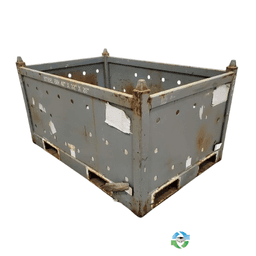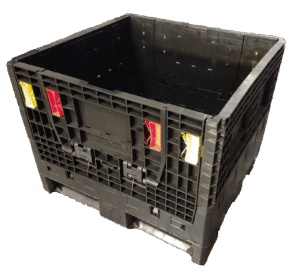Why used bulk containers are efficient for large-scale material management
Wiki Article
Why Mass Containers Are Necessary for Lasting and Economical Transportation
Bulk containers play a crucial duty in modern logistics. They facilitate the reliable activity of large amounts of goods, thus optimizing transport processes. This approach not only minimizes costs but also lessens ecological impact with reduced emissions and waste generation. As markets look for even more sustainable techniques, the fostering of bulk containers is ending up being increasingly considerable. What implications does this change hold for future logistics and supply chain monitoring?
The Benefits of Making Use Of Mass Containers in Logistics
Bulk containers revolutionize logistics by improving performance and sustainability. These containers permit the transport of huge quantities of goods in a solitary trip, considerably lowering the number of journeys needed. This not only improves procedures however also minimizes labor costs associated with handling, filling, and dumping. Furthermore, bulk containers are designed to enhance area usage within transport lorries, guaranteeing that more items can be delivered concurrently.The standardization of mass containers likewise simplifies the logistics process. With uniform measurements, they can be quickly stacked and saved, bring about improved storage facility administration. Moreover, mass containers frequently feature durable products that secure components from damages during transportation, therefore decreasing item loss and raising overall integrity. Consequently, companies can experience improved supply chain performance, eventually bring about raised productivity and customer contentment. This combination of elements makes mass containers a crucial possession in modern logistics.
Environmental Effect: Lowering Waste and Carbon Impact
As markets significantly focus on sustainability, the fostering of mass containers has actually become a vital method for minimizing waste and lowering carbon impacts. These containers decrease making use of packaging materials, such as boxes and plastic, thereby especially lowering general waste generation. By combining shipments, bulk containers enhance transport efficiency, enabling even more items to be transferred per journey. This reduction in journeys directly correlates with reduced greenhouse gas emissions, adding to a smaller carbon footprint.Furthermore, mass containers can usually be reused or recycled, additionally alleviating ecological effect. The durability of these containers warranties they can endure several transport cycles, lowering the requirement for single-use alternatives. used plastic containers. By enhancing logistics and promoting efficient resource use, mass containers not only support lasting techniques but also encourage industries to line up with global ecological objectives. Ultimately, their execution mirrors a commitment to ecological stewardship and accountable source management
Price Financial Savings: Just How Mass Containers Lower Transportation Costs
While several companies look for ways to enhance their profits, the use of bulk containers presents a substantial chance for lowering transport costs. Bulk containers maximize the volume of items transferred, enabling businesses to ship larger amounts at as soon as. This efficiency minimizes the number of trips needed, directly reducing gas prices and lessening labor expenses connected with loading and unloading.Additionally, bulk containers frequently feature structured designs that optimize area utilization within transportation automobiles. This indicates less vacant areas, bring about much more effective usage of offered capacity. Furthermore, the longevity of mass containers can reduce the threat of product damages during transportation, minimizing losses and making sure that more items get here intact.
Enhancing Supply Chain Performance With Bulk Storage Space Solutions
Bulk storage space services play a vital role in improving supply chain efficiency by optimizing supply monitoring. By settling goods into fewer, larger containers, companies can greatly reduce managing expenses related to constant transfers and handling. This streamlined method permits far better monitoring and monitoring of inventory, ultimately bring about improved operational performance.Streamlined Inventory Administration
Reliable stock monitoring is crucial for enhancing supply chain procedures, specifically when organizations take on bulk storage space options. These solutions enable services to maintain higher stock degrees while lessening the regularity of replenishment. By consolidating materials right into mass containers, companies can streamline their stock processes, lowering the intricacy related to tracking numerous smaller sized packages. This technique promotes accurate supply counts and enhances projecting accuracy, enabling for even more informed decision-making. Furthermore, mass storage space options simplify warehouse organization, making it less complicated to locate and gain access to items when required. Because of this, companies can accomplish a much more efficient stock turn over rate, inevitably improving general supply chain performance and decreasing the probability of stockouts or overstock circumstances.
Decreased Handling Costs
The implementation of bulk storage remedies not just enhances stock management yet additionally significantly minimizes handling costs across the supply chain. By settling materials right into bulk containers, companies lessen the requirement for constant handling and transfer in between various storage refurbished bulk containers and transportation units. This approach cuts down on labor costs related to loading, unloading, and moving smaller sized bundles. Additionally, mass storage space decreases the regularity of deliveries, bring about reduced transport expenses and reduced gas consumption. Because of this, services can maximize their logistics procedures, enabling for an extra efficient allowance of resources. Ultimately, reduced dealing with prices add to improved general supply chain performance, fostering an environment that supports both sustainability and economic practicality.
Flexibility of Bulk Containers Throughout Different Industries
Although several sectors have distinctive requirements for transport and storage space, mass containers have arised as a flexible solution that fulfills a wide variety of needs. These containers, ranging from large bins to specialized tanks, can suit varied materials, including granules, powders, and liquids. In the farming market, bulk containers assist in the transportation of plant foods and grains, while the food and drink sector utilizes them for components and ended up items. The chemical industry counts on bulk containers for securely delivering harmful materials, guaranteeing compliance with safety and security guidelines. Furthermore, construction companies profit from bulk containers for carrying accumulations and other products. Their versatility reaches various modes of transportation, including trains, trucks, and ships, boosting logistical effectiveness. This adaptability not only streamlines procedures throughout various fields however additionally promotes sustainability by decreasing packaging waste and maximizing space en route. Bulk containers play a necessary role in contemporary supply chain management.Future Fads in Bulk Container Use and Sustainability
The future of mass container usage is significantly formed by cutting-edge products growth that enhances sustainability. Additionally, automation in logistics assures to streamline operations, reducing waste and boosting performance. Welcoming round economic situation methods will better change exactly how bulk containers are created, utilized, and reused, cultivating a more sustainable transportation landscape.Innovative Products Development
As sectors increasingly prioritize sustainability, innovative products advancement wholesale containers becomes a significant consider enhancing eco-friendly transportation services. Researchers and makers are checking out naturally degradable plastics, recycled compounds, and light-weight steels to reduce environmental influence. These materials not just minimize waste however also enhance gas effectiveness by reducing the general weight of containers. In addition, advancements in clever materials, which can adapt to differing problems, improve the resilience and functionality of bulk containers. The assimilation of these innovative products straightens with circular economic climate concepts, promoting reuse and recycling. As the need for sustainable practices expands, the advancement of such materials will certainly play an essential function in shaping the future of mass container use in logistics and transportation.Automation in Logistics
Significant developments in automation are positioned to transform logistics and the utilization of mass containers, boosting sustainability in transport. Automated systems, consisting of drones and self-governing lorries, are simplifying the activity of bulk containers, lowering the reliance on traditional fuel-powered transport. These technologies enhance directing and filling processes, improving and minimizing vacant miles fuel effectiveness. Additionally, automated stock management systems boost tracking and monitoring of mass containers, ensuring much better source appropriation and decreased waste. The combination of the Internet of Things (IoT) enables real-time data analysis, making it possible for positive decision-making that lines up with sustainability goals. As automation remains to progress, it is expected to drive additionally innovations in mass container usage, inevitably supporting even more sustainable logistics techniques and reducing the ecological influence of transport.Round Economy Practices
Advancements in automation are establishing the stage for an extra integrated method to circular economic situation practices in the domain of bulk container use. As sectors progressively accept sustainability, mass containers are being created for longevity and reusability. This change not just lessens waste yet likewise boosts resource effectiveness. Business are embracing approaches such as closed-loop systems, where used containers are gathered, refurbished, and reintroduced into the supply chain. In addition, clever modern technologies track container life cycles, facilitating far better monitoring and decreasing ecological influence. The collaboration between producers, logistics service providers, and end-users is vital in developing requirements for lasting container use. used plastic containers. Future patterns indicate a growing focus on materials that are recyclable and eco-friendly, further reinforcing the round economic situation's concepts wholesale transport
Frequently Asked Questions
What Products Are Mass Containers Normally Made From?
Bulk containers are generally constructed from durable materials such as high-density polyethylene, cardboard, steel, and aluminum. These products give flexibility, protection, and stamina, making them ideal for transferring different items in different industries successfully.Exactly how Do I Select the Right Size Mass Container?
Selecting the best size bulk container includes evaluating the quantity of products to be delivered, considering taking care of tools compatibility, and appraising storage space needs. Appropriate size assurances efficiency in transport and lessens waste during delivery.Are Mass Containers Reusable or Recyclable?
Mass containers are typically reusable, developed for multiple trips, enhancing sustainability. Lots of can additionally be reused, depending upon the materials made use of. Selecting recyclable alternatives better supports ecological goals and reduces waste in transport practices.What Safety And Security Regulations Put On Bulk Container Transport?
Safety laws for bulk container transportation consist of conformity with the Department of Transportation guidelines, proper labeling of hazardous products, structural stability analyses, and adherence to weight limitations to ensure secure handling and stop accidents throughout transit.Exactly How Can Companies Change to Utilizing Bulk Containers Properly?
Businesses can alter to bulk containers by assessing current logistics, educating staff on handling, spending in ideal devices, enhancing supply management, and teaming up with vendors to ensure compatibility and efficiency throughout the supply chain.
As sectors significantly focus on sustainability, the adoption of mass containers has actually emerged as a vital technique for decreasing waste and decreasing carbon footprints. By consolidating materials into bulk containers, companies can simplify their inventory procedures, lowering the complexity associated with tracking multiple smaller plans. As industries increasingly prioritize sustainability, cutting-edge products growth in bulk containers emerges as a substantial variable in improving environmentally friendly transportation options. Automated systems, consisting of drones and autonomous automobiles, are enhancing the motion of bulk containers, reducing the reliance on typical fuel-powered transport. Furthermore, automated stock management systems enhance monitoring and tracking of mass containers, making certain much better source allowance and decreased waste.
Report this wiki page